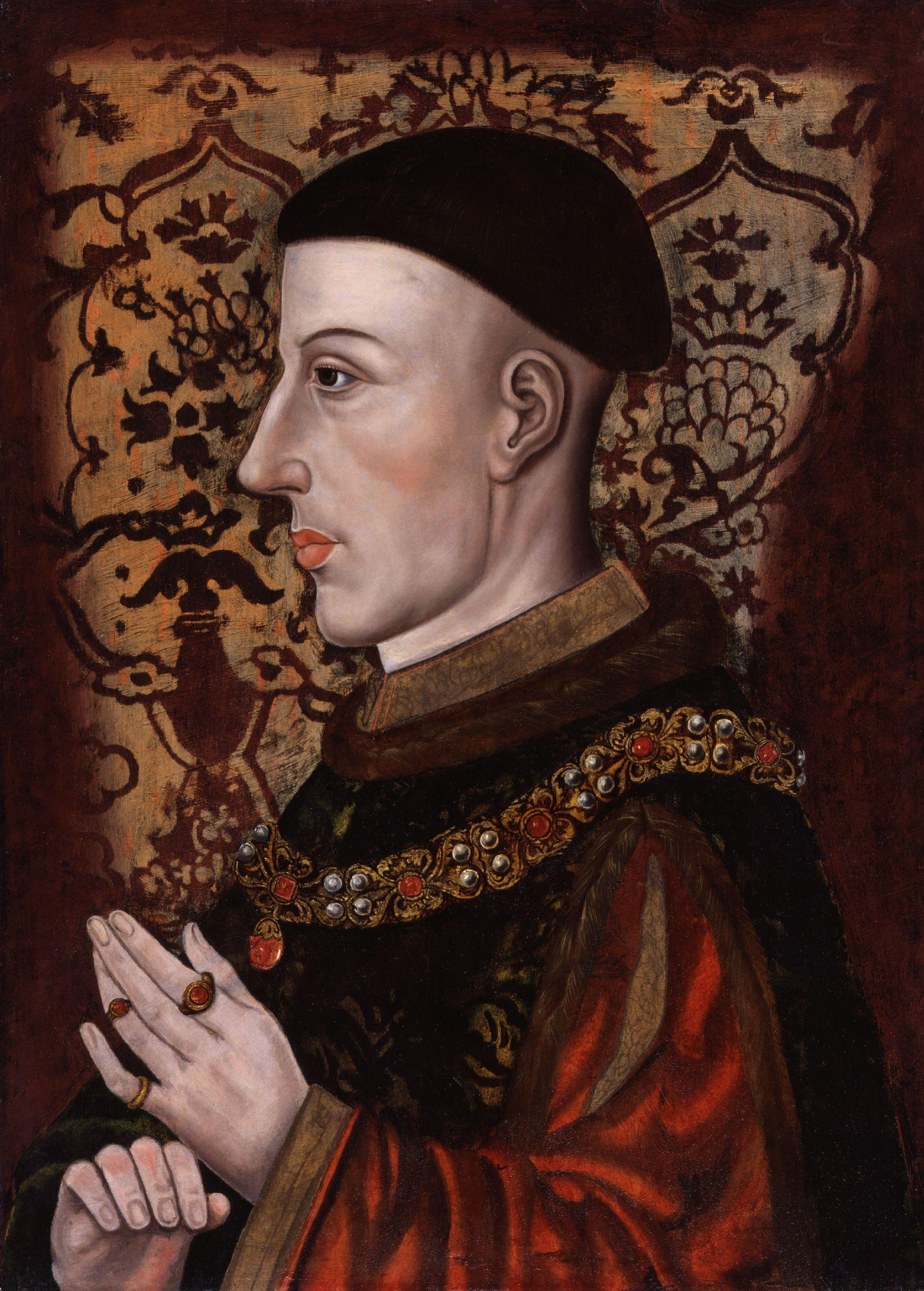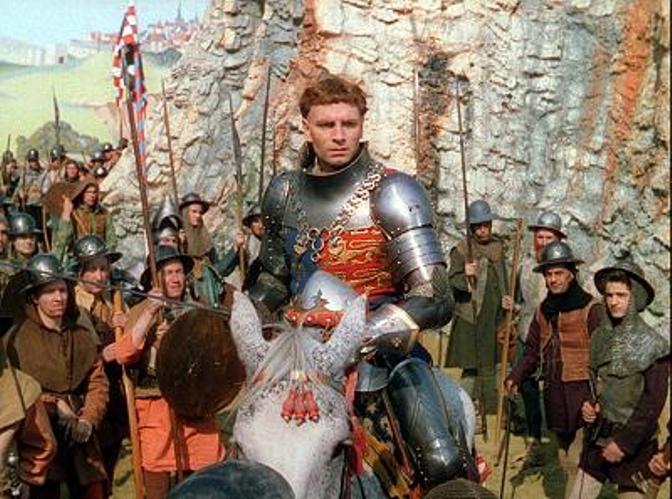There are just so many things to talk about with "Henry V." I'm a big fan of history so I'm geeking out a lot reading this play. I love looking at the historical background of the characters and seeing the real historical accounts for Henry V. It's fascinating to say the least!
For instance, did you know that St. Crispin's Day is October 25th? I sure didn't!
I also especially love looking at paintings and pictures of old documents. Here are a few for you:

This is a picture of the original Quarto version, also known as the "Bad Quarto" because it was a shortened version of the play.

Ahhh...here's "handsome" Hal for you! This painting was done by an unknown artist.
Personally, I like this version better, a still from the movie adaptation by Kenneth Branagh Makes Hal look much more intimidating and very much the "dashing army king," eh?

Another thing that I've been researching is what scholars have been saying about Shakespeare's interesting word choice of the play. While searching at the BYU Library I came across an interesting article by Brian Roberts. In his article he discusses Fluellen's speech patterns to King Henry. In Act III Scene VI Fluellen states in his Welsh accent that they, "maintain'd the pridge"-really meaning that they maintained the BRIDGE.
However, Roberts states that this "accent" had a distinctive purpose and held darker, more condescending meanings. Connecting the 'pridge' (bridge) to Henry's marriage to Katherine, Roberts states that:
"As this marriage symbolizes the nature of England's union with France, and as Fluellen's words may be interpreted as commentary on that union, the union at first seems admirable. Fluellen, in fact, celebrates Henry's transgression of boundaries, calling the king's imminent efforts "gallant and most [b]rave passages" (93). As Fluellen's Welsh accent changes his pronunciation of the word brave to prave, however, English advancement toward union acquires sinister nuances. Stemming from the Latin pravus, meaning "crooked, perverse, [or] vicious," the word prave for Shakespeare's contemporaries brought with it the following definitions: "vicious, evil, [or] depraved" (OED, Def. 1.1). Thus, as prave modifies passages, Henry's entire enterprise--culminating in his marriage to Katherine--is cast in crooked light."
Isn't that fascinating? I never would have even thought to research something like that! It really makes me wonder just how much I truly understand about Shakespeare's language and how many hidden meanings I'm completely overlooking!
What say you? Do you support Roberts' theories? Do you think their interesting? What have you noticed about the play that may not be completely obvious? I would love to hear your theories and insight!
For instance, did you know that St. Crispin's Day is October 25th? I sure didn't!
I also especially love looking at paintings and pictures of old documents. Here are a few for you:

This is a picture of the original Quarto version, also known as the "Bad Quarto" because it was a shortened version of the play.

Ahhh...here's "handsome" Hal for you! This painting was done by an unknown artist.
Personally, I like this version better, a still from the movie adaptation by Kenneth Branagh Makes Hal look much more intimidating and very much the "dashing army king," eh?

Another thing that I've been researching is what scholars have been saying about Shakespeare's interesting word choice of the play. While searching at the BYU Library I came across an interesting article by Brian Roberts. In his article he discusses Fluellen's speech patterns to King Henry. In Act III Scene VI Fluellen states in his Welsh accent that they, "maintain'd the pridge"-really meaning that they maintained the BRIDGE.
However, Roberts states that this "accent" had a distinctive purpose and held darker, more condescending meanings. Connecting the 'pridge' (bridge) to Henry's marriage to Katherine, Roberts states that:
"As this marriage symbolizes the nature of England's union with France, and as Fluellen's words may be interpreted as commentary on that union, the union at first seems admirable. Fluellen, in fact, celebrates Henry's transgression of boundaries, calling the king's imminent efforts "gallant and most [b]rave passages" (93). As Fluellen's Welsh accent changes his pronunciation of the word brave to prave, however, English advancement toward union acquires sinister nuances. Stemming from the Latin pravus, meaning "crooked, perverse, [or] vicious," the word prave for Shakespeare's contemporaries brought with it the following definitions: "vicious, evil, [or] depraved" (OED, Def. 1.1). Thus, as prave modifies passages, Henry's entire enterprise--culminating in his marriage to Katherine--is cast in crooked light."
Isn't that fascinating? I never would have even thought to research something like that! It really makes me wonder just how much I truly understand about Shakespeare's language and how many hidden meanings I'm completely overlooking!
What say you? Do you support Roberts' theories? Do you think their interesting? What have you noticed about the play that may not be completely obvious? I would love to hear your theories and insight!

I agree that is really interesting! Thanks for bringing that to light. I often think I am missing tons in the Shakespeare language. For example, in the the tennis ball scene we both posted, I never noticed how many times the word "ball" is said as a pun on masculinity and how certain of those phrases indicated more of a testicle version of balls then the surface cannon and tennis balls it appears to be talking about! The things you learn during research :) blows my mind
ReplyDeleteI completely agree with your insight on the tennis ball scene. There's certainly A LOT more going on than what's apparent on the surface. I had the same revelation about the language you did! It certainly is mind blowing! :)
Delete